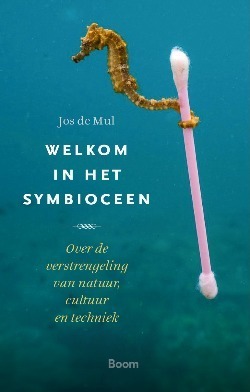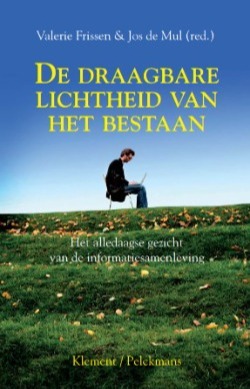Jos de Mul. Foreword: From the Mediatic Turn to Gua-le-ni. In: Stefano Gualeni. Virtual Worlds as Philosophical Tools. How to Philosophize With a Digital Hammer. London: Palgrave Macmillan 2015, x-xiii.
In the last couple of decades a new discipline, called ‘media philosophy’, has entered the philosophical arena. According to Reinhard Margreiter, one of its proponents, this name refers not only, and not even predominantly, to the exploration of yet another ontological domain, but rather designates a fundamental transformation of philosophy itself, which is characterized by a turn towards (the descent and history of) the mediatic foundations of philosophy. In his view, media philosophy might become a contemporary ‘prima philosophia’ (Margreiter 2003, 151). However, Margreiter does not argue for a modernist kind of foundationalist superdiscipline, but rather for a critical discourse that has to accompany every act of knowing.
Though the name ‘media philosophy’ is a recent invention, the phenomenon is not altogether new. Already in Plato’s Phaedrus and Seventh Letter we find fundamental reflections on the impact of writing on philosophy, that is: on the type of oral philosophy that precedes written philosophy and which is still reflected in the dialogical form of Plato’s writings. However, in the tradition of Western philosophy, which is strongly connected with the book, this kind of reflection remains relatively scarce and marginal for a long time. Starting from Parmenides’ identification of being and thinking, a dominant part of the metaphysical tradition was based on the presupposition that thinking and being – nous and phusis – share the same form (eidos, morphé), guaranteeing the identity of what can be thought and what can be (cf. Allen 2004, 218).
Kant’s transcendental philosophy can be regarded as the first radical critique of this metaphysical equation of thinking and being. According to Kant there is no immediate and absolute knowledge of reality, because it depends on the finite medium of the human faculties of sensibility, understanding, and reason. However, as Kant deems this medium to be timeless and shared by all human beings, he still could adhere to the notion that the phenomenological world constituted by this medium, is something that has empirical objectiveness and as such is open to scientific explanation, prediction and control. In post-kantian philosophy two further developments can be distinguished that together have resulted in what might be called ‘the mediatic turn’ in modern philosophy.
The first of these developments has to do with the historization of human reason (cf. De Mul 2004, 97-125). After Kant the idea emerged that human reason is not a timeless entity but something that develops in – natural and historical – time. Whereas in Hegel’s philosophy this historization was still regarded as a process in which Absolute – that is: suprahistorical – Reason finally becomes conscious of itself (and in this sense returned to a pre-kantian metaphysics), in the hermeneutical tradition – starting with Dilthey and radicalized in Heidegger and his post-modern heirs – the emphasis gradually shifts to the finiteness of human experience and the radical historical character of ontology.
The second development in the post-kantian philosophy I refer to is what might be called the externalization of human reason. It is connected to the realization that the thinking of being always requires an external medium. Already in the 19th century, Herder and Von Humboldt emphasized both the crucial role natural language plays in thinking, and the non-transparency of this medium. In the continental tradition it was again in the hermeneutical tradition – to which we might include Nietzsche, the philosopher with the hammer who blamed grammar for our belief in God (Nietzsche 1980, Band 6, 78) – that this insight was developed further.
In the analytical tradition a similar development took place in the so-called ‘linguistic turn’ (Rorty 1967). This turn was accompanied with the ‘belief that the problems of philosophy may be solved or dissolved either by reforming language (the advocates of this were dubbed “ideal language philosophers”) or by a better understanding of the language we actually use (“ordinary language philosophers”) (Hacker 2007). Wittgenstein played a crucial role in both manifestations of the linguistic turn. In the mainstream interpretation of Wittgenstein – sketched broadly enough to abstract from the many disagreements – Wittgenstein in the Tractatus held that ‘the sentences of our language, fully analyzed, necessarily reflect the metaphysical form of the world’ and that ‘all philosophy is a critique of language’. However, in his belief in the correspondence between being and the logical form of language, Wittgenstein – in spite of his radical restriction of meaningful language to elementary and complex propositions of science and his critique of every philosophy that pretends to go beyond these propositions – remained a victim of Platonic metaphysics. In his later writings – I am still sketching the mainstream interpretation – Wittgenstein criticized his earlier position and developed a therapeutic philosophy which aimed to dissolve philosophical problems by analyzing the many confusions that characterize our ordinary language.
What distinguishes recent media philosophy from the earlier continental and analytical approaches is the fact that its scope goes far beyond the linguistic domain. Inspired by the emergence and impact of new media such as radio, film, television and the computer, and by the work of otherwise diverse thinkers such as Cassirer, Langer, McLuhan, Ong, Goodman and Derrida (to mention a few), the mediatic self-reflection has been extended to (the symbolic and material dimension of) all cultural media of experience. In this ‘mediatic turn’ the development of computer mediation has become a central topic. One of the reasons for our fascination with computers is that with the development of information and communication technologies (ranging from artificial intelligence and expert systems to social media and Big Data analysis), the ‘outsourcing’ of human reason seems to enter an entirely new phase, which in its radicalism perhaps can only be compared to the externalization of thinking in writing, several millennia ago.
Stefano Gualeni’s Virtual Worlds as Philosophical Tools. How to Philosophize with a Digital Hammer offers a highly original and recommendable contribution to the mediatic turn. In this interdisciplinary investigation he combines the theoretical insights of philosophy and media studies with his practical experience as game designer. It is especially this ludic perspective, which makes this study especially worth reading. Of course, phenomena such as computer games, serious learning, and the ‘ludification’ of human identity and culture has attracted much scholarly attention in the last couple of decades (cf. Frissen et al 2015). What distinguishes Gualeni’s study is his penetrating analysis of the ontological dimension of computer games. Viewing man and world sub specie ludi is of course not an entirely new phenomenon. Already early in Western thought, Heraclitus speculated that “the course of the world is a playing child moving figures on a board – the child as absolute ruler of the universe” (Sprague 2001, 26). And more recently, in his highly influential Homo ludens (first published in Dutch in 1938), Johan Huizinga claims that play is the very origin of all human culture: “It does not come from play like a babe detaching itself from the womb: it arises in and as play, and never leaves it” (Huizinga 1955, 173, italics JdM). Huizinga argues that this is not only true for cultural phenomena like rituals, sports, theatre, legal practice, and warfare, but no less for the philosophical attempts to understand the world with the help of concepts. Echoing Kant and Schiller, Huizinga emphasizes the crucial role of playful human imagination.
As Gualeni shows in his study, the development of computer games have created an exciting new domain for philosophical imagination. I am certain that the reader who follows Gualeni on his ludic path, will not only experience that this study is a fun read, but that it also will expand his ontological horizon. Well, if that isn’t serious gaming, what else is?
References
Allen, B. 2004. Wittgenstein’s Onto-Logics. In Post-analytic Tractatus, edited by B. Stocker. Aldershot, Hants, England; Burlington, VT: Ashgate.
De Mul, J.. 2004. The Tragedy of Finitude. Dilthey’s Hermeneutics of Life. New Haven: Yale University Press.
Frissen, V., M. de Lange, J. de Mul, S. Lammes & J. Raessens, eds. 2015., Playful identities. The Ludification of Digital Media Cultures. Amsterdam: Amsterdam University Press.
Hacker, P. 2007. Analytic Philosophy: Beyond the linguistic turn and back again. In The Analytic Turn: Analysis in Early Analytic Philosophy and Phenomenology, edited by M. Beaney. London: Routledge.
Huizinga, L. 1955. Homo ludens: A study of the play-element in culture. Boston, MA: Beacon Press.
Margreiter, R. 2003. Medien/Philosophie ein Kippbild. In Medienphilosophie: Beiträge zur Klärung eines Begriffs, edited by S. Münker, A. Roesler and M. Sandbothe. Frankfurt am Main: Fischer Taschenbuch Verlag.
Nietzsche, F. 1980. Sämtliche Werke. Kritische Studienausgabe. 15 vols. Berlin: De Gruyter.
Sprague, Rosamond Kent, ed. 2001. The older Sophists: A complete translation by several hands of the fragments in Die Fragmente der Vorsokratiker, edited by Diels-Kranz. With a new edition of Antiphon and of Euthydemus. Indianapolis, IN: Hackett Publishers.









